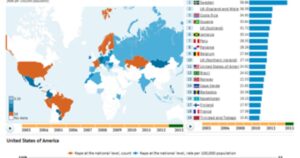In the bustling landscape of Southeast Asia Thailand stands out as a burgeoning hub of digital innovation and technological advancement. Over the past decade the nation has witnessed a rapid proliferation of new digital technologies revolutionizing various aspects of daily life and propelling its economy into the digital age.
From the widespread adoption of high speed internet infrastructure like 5G networks to the flourishing of e-commerce platforms and mobile applications Thailand‘s digital transformation is reshaping industries and redefining societal norms. In this blog we embark on a journey to explore the dynamic landscape of new digital technology in Thailand examining its impact on society, economy and the country’s trajectory towards further innovation and digitalization.
Through a comprehensive analysis of key sectors, initiatives and trends we unravel the intricate tapestry of Thailand‘s digital frontier offering insights into the opportunities and challenges that lie ahead in this exciting era of technological evolution.
Navigating Thailand’s Digital Frontier
Thailand‘s digital frontier represents a dynamic landscape of opportunities and challenges as the nation strides towards technological prominence. With substantial investments from major telecom companies like AIS and True the country has witnessed remarkable growth in internet infrastructure, including the recent rollout of 5G networks in 2022.
This expansion has catalyzed widespread digital adoption particularly in urban centers where platforms like Lazada, Shopee, Grab and Line Man have emerged as integral components of daily life, facilitating e-commerce, food delivery and transportation services.
Moreover, the advent of Thailand 4.0 in 2016 marked a pivotal moment in the country’s digital journey, signaling a strategic shift towards high-value sectors driven by technology and innovation.
While initiatives such as subsidies for rural fiber broadband access have endeavored to bridge the digital divide, challenges persist in ensuring equitable access to digital services nationwide. Navigating regulations surrounding data privacy and cybersecurity also poses significant considerations as Thailand continues its digital ascent.
In navigating Thailand‘s digital frontier a skilled technology workforce emerges as a critical asset in driving further innovation and sustainable growth. While programs aimed at fostering talent abound the phenomenon of brain drain remains a concern prompting the need for concerted efforts to retain and attract skilled professionals.
By investing in infrastructure fostering startup ecosystems and navigating regulatory landscapes with foresight and agility Thailand stands poised to emerge as a leader in Southeast Asia’s ever-evolving digital landscape charting a course towards a prosperous and digitally empowered future.
Furthermore, Thailand’s digital frontier is characterized by a vibrant ecosystem of startups and innovators exploring new frontiers in fintech, health tech and smart cities. These entrepreneurial endeavors, coupled with strategic policymaking and public-private partnerships position Thailand at the forefront of digital transformation in the region.
As the country navigates the complexities of its digital journey strategic investments in infrastructure and human capital are paramount to realizing its full potential. By embracing innovation fostering collaboration and championing inclusivity Thailand is poised to harness the power of new digital technologies to drive societal progress and economic prosperity for generations to come.

Driving Thailand’s Tech Evolution
Thailand‘s tech evolution represents a journey fueled by innovation, collaboration, and strategic foresight. Spearheaded by major telecom companies’ investments in cutting-edge infrastructure, such as the rollout of high speed 5G networks in 2024 the nation has embraced a transformative digital landscape.
This evolution has not only empowered urban centers with ubiquitous connectivity but has also catalyzed the emergence of a dynamic startup ecosystem with Bangkok emerging as a vibrant hub for tech innovation in Southeast Asia.
Moreover, government initiatives, including the Thailand 4.0 policy launched in 2016, have played a pivotal role in steering industries towards innovation-driven sectors. With a focus on creativity and technology, Thailand is harnessing the power of artificial intelligence, blockchain, and big data to drive economic growth and societal progress.
By fostering partnerships between academia, industry and government aims to position itself as a regional leader in technology and innovation. As Thailand‘s tech evolution continues to unfold strategic investments in digital infrastructure talent development and regulatory frameworks will be crucial to sustaining momentum and realizing the nation’s digital ambitions.
By embracing a culture of innovation, collaboration and inclusivity Thailand is poised to chart a transformative path towards a digitally empowered future driving economic prosperity and societal well being for all its citizens.
Furthermore, Thailand‘s tech evolution extends beyond traditional sectors, with emerging industries like fintech, healthtech and e-commerce reshaping the economic landscape. Digital platforms such as Lazada, Shopee, Grab and LINE are revolutionizing consumer experiences and transforming business models, driving Thailand towards a more digitally integrated economy.
With a proactive approach towards nurturing talent fostering entrepreneurship and leveraging emerging technologies, Thailand is not only adapting to the digital age but is also actively shaping its trajectory, positioning itself as a dynamic player in the global tech arena. As the nation continues to drive its tech evolution forward, strategic investments and collaborative efforts will be essential in unlocking new opportunities, fostering innovation and driving sustainable growth in the digital era.
you also like this post: What were Trails Carolina Horror Stories all about? – All in One Guide
Digitalization’s Reach in Thai Communities
The impact of digitalization in Thai communities is profound, transcending geographical boundaries and reshaping societal norms. With the nationwide rollout of high speed fiber broadband networks and 4G/5G mobile services even remote areas have witnessed a surge in online connectivity unlocking new opportunities for economic and social advancement.
In urban centers, platforms like Facebook, YouTube and ride hailing apps have become ubiquitous, facilitating communication, entertainment and transportation services. Moreover, the COVID-19 pandemic has accelerated the adoption of digital technologies, with e-commerce sites experiencing a surge in popularity and online services becoming indispensable in daily life.
Rural residents are also increasingly engaging with digital platforms, leveraging initiatives like digital government services and fintech applications to access essential services and financial resources. Efforts to bridge the digital divide are underway with initiatives like the Digital Economy Promotion Agency working to expand digital literacy and support community based startups.
By promoting digital inclusion and equal access to technology Thailand is empowering communities to participate in the digital economy and seize opportunities for growth and development. As connectivity continues to expand and digital literacy proliferates, Thailand‘s communities are poised to thrive in the digital age, driving progress and innovation across the nation.

Government Initiatives
The Thai government has embarked on a proactive journey to promote the widespread development and adoption of digital technologies through a series of strategic policy programs and dynamic public-private partnerships.
Central to this effort is the landmark Thailand 4.0 policy launched in 2016, which aims to propel key industries towards innovation driven high value sectors characterized by modern capabilities such as advanced manufacturing, automation and emerging technologies.
One of the pivotal initiatives in this endeavor is the establishment of the Digital Economy Promotion Agency in 2018, tasked with spearheading various programs to bridge the urban-rural digital divide.
These initiatives include expanding high-speed fiber broadband access through nationwide infrastructure projects undertaken in collaboration with internet service providers. Additionally, subsidy programs have been implemented to incentivize private sector research and development in critical fields such as artificial intelligence, blockchain, and big data.
Furthermore the government has prioritized fostering local digital skills and literacy to ensure that all citizens can fully participate in the digital economy. The National Digital ID program, launched in 2020 represents a significant step towards this goal providing a comprehensive digital ID system that enhances convenience and accessibility across public services.
Through strategic partnerships with international allies and specialized tech parks, Thailand is actively engaging in collaborations focused on emerging technologies. These partnerships, coupled with subsidy programs supporting technology adoption and startup development, underscore the government’s commitment to driving economic and social development through digital innovation.
As Thailand continues to navigate its digital journey, sustained efforts towards policy leadership, infrastructure development and talent cultivation will be essential to realizing the nation’s ambition of becoming Southeast Asia’s leading digital hub.
By leveraging government initiatives and fostering a conducive environment for innovation Thailand is poised to harness the full potential of digital technologies to drive inclusive growth and prosperity for all its citizens.

Nurturing Entrepreneurial Talent
Fostering entrepreneurial talent is a cornerstone of Thailand‘s strategy for driving innovation and sustainable economic growth in the digital era. Recognizing the critical role that startups and innovators play in driving technological advancement and job creation the government has implemented a range of initiatives aimed at nurturing an entrepreneurial ecosystem conducive to innovation and creativity.
Central to these efforts is the cultivation of a dynamic startup culture across diverse sectors. Bangkok, in particular, has emerged as a vibrant hub for Southeast Asian startups buoyed by flagship government programs like the Bangkok Startup City initiative launched in 2020.
This initiative has created designated startup zones tailored to various tech verticals, providing startups with the infrastructure and support they need to thrive. Moreover the government has implemented improved startup support mechanisms to attract and retain young talent domestically, mitigating the challenge of brain drain.
By clustering startups in collaborative communities barriers to entry are lowered, encouraging knowledge sharing and fostering an environment conducive to out of the box problem solving.
Additionally the government is investing in initiatives aimed at developing the entrepreneurial mindset and skills of the next generation. Through university programs, startup incubators, accelerators, and hackathons, Thailand is nurturing a pipeline of tech talent poised to drive local digital innovations onto the global stage.
By embracing a culture of entrepreneurship, collaboration and innovation Thailand is laying the groundwork for a thriving startup ecosystem capable of driving sustainable economic growth and societal progress in the digital age.
Through strategic investments in talent development, infrastructure and supportive policies Thailand is empowering its entrepreneurial community to seize opportunities, tackle challenges, and shape the future of the nation’s digital economy.
Digital Inclusion

In Thailand, digital inclusion is not just a goal, it is a fundamental commitment to ensuring that every individual regardless of location or background has equal access to the benefits of the digital revolution.
Recognizing the transformative power of digital technologies in driving economic empowerment and social development, the Thai government has embarked on a multifaceted approach to promote digital inclusion across all segments of society.
At the forefront of this effort is the expansion of high-speed connectivity infrastructure, with initiatives like nationwide fiber broadband rollout and the deployment of 4G/5G mobile services. These efforts have been instrumental in extending online access to even the most remote areas of the country, empowering communities with the tools and resources needed to thrive in the digital age.
In parallel, initiatives aimed at fostering digital skills and literacy play a crucial role in ensuring that individuals can fully participate in the digital economy. Programs like the Digital Society Development Plan (2020-2024) support initiatives such as Learn to Code programs for students nationwide, equipping them with the digital skills needed to succeed in the digital workforce.
Moreover, the implementation of the National Digital ID system has streamlined access to public services and transactions, reducing barriers often faced by disadvantaged groups. Initiatives like community e-learning and telehealth centers, supported by subsidies, further promote digital inclusion by improving access to essential services in underserved areas.
Nongovernmental organizations and private sector partnerships also play a vital role in advancing digital inclusion efforts. Collaborative projects aimed at setting up free public WiFi hotspots and promoting digital literacy among vulnerable populations demonstrate the collective commitment to ensuring that no one is left behind in Thailand‘s digital transformation journey.
By prioritizing digital inclusion and equal access to technology, Thailand is not only empowering individuals and communities but also fostering a more inclusive and equitable society. As connectivity continues to expand and digital literacy proliferates, Thailand‘s commitment to digital inclusion will serve as a cornerstone of its efforts to drive progress and prosperity for all its citizens in the digital age.
You might want to see this post: What is Pi123? Everything You Need To Know About It
Safeguarding Thailand’s Digital Infrastructure
As Thailand rapidly expands access to crucial digital infrastructure nationwide, ensuring its reliability and security has become a pressing national priority. Major telecom operators have made significant investments in upgrading nationwide fiber broadband and 5G mobile networks in recent years, bolstering connectivity and laying the foundation for a digitally empowered society.
However the inherent vulnerabilities of digital infrastructure coupled with the ever evolving threat landscape, necessitate proactive measures to safeguard against potential disruptions and cyber threats.
To address these challenges the Thai government established the Digital Economy and Society Ministry in 2022 tasked with coordinating between relevant agencies on digital issues and enhancing the resilience of the nation’s digital infrastructure. One key focus area is strengthening disaster response plans to minimize network disruptions during emergencies, ensuring uninterrupted access to essential services for citizens across the country.
Furthermore, the National Cyber Security Agency of Thailand, established in 2018, plays a crucial role in proactively monitoring networks and fostering cybersecurity collaboration between the public and private sectors. By implementing robust cybersecurity measures and fostering a culture of cyber resilience Thailand aims to mitigate the risks posed by cyber threats and safeguard critical digital assets against potential attacks.
Privacy and data protection are also paramount considerations in safeguarding Thailand‘s digital infrastructure. The enactment of a comprehensive data protection law in 2019 reinforces security standards and transparency ensuring the privacy and confidentiality of user data across digital platforms and services.
Ultimately, the successful implementation of ongoing measures to safeguard Thailand‘s digital infrastructure will be critical in maintaining public trust and confidence in digital services. By prioritizing cybersecurity, disaster preparedness and data protection Thailand can ensure the reliability, resilience and security of its digital infrastructure laying the groundwork for continued innovation and prosperity in the digital age.

Charting a Course for Digital Progress
Thailand stands at a pivotal juncture in its digital journey, poised to chart a course towards unprecedented progress and prosperity in the digital age. With rapid advancements in technology and the transformative impact of digitization on society and the economy the Thai government recognizes the importance of strategic planning and visionary leadership in harnessing the full potential of digital technologies to drive sustainable development and inclusive growth.
Central to this endeavor is the adoption of a whole of government approach under the Digital Economy and Society Ministry aimed at maximizing the benefits of digitalization through coordinated policymaking and strategic investments in digital infrastructure talent development and innovation ecosystems.
The National Digital Development Plan 2023-2027 identifies priorities around inclusive digital skills development, cybersecurity and leveraging data for informed policy decisions, laying the groundwork for a comprehensive and holistic strategy for digital progress.
Key to Thailand‘s digital advancement is the continued investment in upgrading nationwide digital infrastructure, including 5G networks, fiber broadband and smart city initiatives. By closing divides and expanding access to digital services across rural and urban regions, Thailand aims to ensure that all citizens can fully participate in and benefit from the digital economy.
Moreover, partnerships between the public sector, local communities and multinational corporations are critical in fostering grassroots innovation and driving economic growth. Regional tech parks launched under new Smart City Special Economic Zone policies cultivate global startups with positive local impact promoting collaboration and knowledge sharing in emerging technology domains.
Strategies also target developing Thailand‘s position as a regional tech leader through high skilled jobs and exports. By nurturing local talent and fostering an environment conducive to innovation and entrepreneurship Thailand aims to capitalize on emerging opportunities in fintech, healthtech, agritech and sustainable energy, driving economic diversification and resilience in the digital era.
While challenges such as brain drain and regulatory complexities remain, Thailand shows promise in cultivating self-sustaining ecosystems that drive innovation and propel the nation towards digital leadership in Southeast Asia and beyond.
Through strategic policymaking, collaborative partnerships and a steadfast commitment to inclusivity and sustainability, Thailand is charting a transformative path towards a digitally empowered future where technology serves as a catalyst for progress and prosperity for all its citizens.
Frequently Asked Questions
What is the National Digital ID program in Thailand?
The National Digital ID program is a comprehensive digital ID system used across public services to enhance convenience and accessibility for citizens.
How is Thailand safeguarding its digital infrastructure?
Thailand is safeguarding its digital infrastructure by strengthening disaster response plans, proactively monitoring networks for cybersecurity threats and enacting data protection laws to ensure privacy and security.
What initiatives are promoting digital literacy in Thailand?
Initiatives such as Learn to Code programs for students, community e learning centers, and partnerships with telecom giants to set up free public WiFi hotspots are promoting digital literacy across Thailand.
What role do partnerships play in Thailand’s digital progress?
Partnerships between the public sector, local communities and multinational corporations foster grassroots innovation, drive economic growth and cultivate global startups with positive local impact.
How is Thailand positioning itself as a regional tech leader?
Thailand is positioning itself as a regional tech leader by investing in high-skilled jobs and exports, nurturing local talent and fostering innovation and entrepreneurship in emerging technology domains.
Conclusion
Thailand’s journey into the digital age is characterized by remarkable progress, strategic initiatives and a commitment to inclusive growth. With the implementation of Thailand 4.0 and a focus on emerging technologies the nation has positioned itself as a leader in Southeast Asia’s dynamic digital landscape. From the widespread adoption of high-speed internet infrastructure to the flourishing startup ecosystem and government led programs promoting digital inclusion, Thailand is harnessing the power of technology to drive economic prosperity and societal advancement.
By prioritizing innovation, collaboration, and inclusivity, Thailand is charting a transformative path towards a digitally empowered future where technology serves as a catalyst for progress and prosperity for all its citizens. As the nation continues its digital journey, sustained efforts towards policy leadership, infrastructure development, and talent cultivation will be essential to realizing its vision of becoming a regional tech hub and driving sustainable growth in the digital era.











